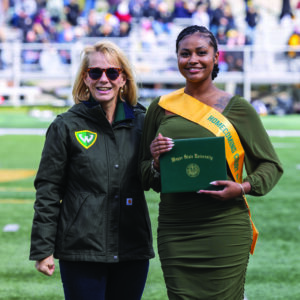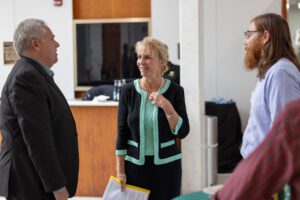A leader with more than 25 years of experience in higher education, Dr. Kimberly Andrews Espy was unanimously elected the 13th president of Wayne State University in 2023 by the Board of Governors
 What is one thing you’re particularly excited about as you settle in as president at Wayne State?
What is one thing you’re particularly excited about as you settle in as president at Wayne State?
I have been so impressed with the university’s commitment to our community and engagement with others to make an impact. Through teaching, research and service in partnerships with the business community, clinical partners, nonprofits, foundations, faith-based institutions and governmental entities, our faculty, staff and students are advancing the fabric of our communities. Wayne State is truly a university in, with and for Detroit — and helping to make our city a better place.
Wayne State is one of 10 public universities participating in the Michigan Assured Admission Pact, which guarantees admission to students with 3.0 GPA or higher. What long term impact will this have on enrollment and Michigan’s talent pipeline?
Wayne State has a long history of successfully enabling access to a top-tier college education for those with the determination and talent to succeed, regardless of their background, age or ZIP code. The Michigan Assured Admission Pact is just another tool in our toolbox that makes the admission decision crystal clear. This way, every hard-working high school student knows they can pursue their dreams for a bright future through higher education. The MAAP will increase college-going and fuel our talent pipeline for Detroit’s 21st century economy.
Wayne State has been a leader in improving graduation rates, particularly for students of color and economically disadvantaged students (Warrior Way Back was a prime example of a model that removed barriers). What needs to be done to continue to close equity gaps and improve student success in higher education?
We know that one of the biggest barriers to attending college is family resources – Wayne State has been successful by addressing affordability through investing heavily in financial aid for our talented students. As a result, more than half of our first-year students are attending Wayne State tuition free, thanks to a combination of financial aid programs including the Wayne State Guarantee, the Heart of Detroit Tuition Pledge and the Detroit Promise. Once students are enrolled, we continue to invest in them by providing services such as professional coaching; peer mentors; and high-touch, care-driven support and monitoring.
What do you think the Detroit Region and state need to do better to retain more of our young talent once they graduate from our universities?
We’re proud that the large majority of Wayne State grads stay in the Detroit area and work as doctors, business leaders, lawyers, teachers and other professionals. Retaining even more graduates across the state will take all of us. Public research universities, industry and government need to come together to create and support thriving urban environments where young people want work, play and live. Through partnering, these urban ecosystems in turn create and attract new businesses in a virtuous cycle, with skilled jobs at competitive wages that benefit our communities.
Recent Chamber polling has shown that fewer people are recognizing the value of a four-year degree, yet data shows that earning power is much higher and odds of unemployment significantly lower with a bachelor’s degree or higher. How do we combat this misperception so many have about the value of a four-year degree?
 Wayne State is a university of opportunity, taking students to a different place than where they started. On average, there is no better public or personal investment than a college education to promote career success, and yet there certainly are many examples of successful individuals with other paths. Universities can further promote the value of college by coupling top-tier academics with “learning by doing” experiences that foster in-demand marketable skills such as problem-solving, leadership, teaming and communication through partnerships with employers.
Wayne State is a university of opportunity, taking students to a different place than where they started. On average, there is no better public or personal investment than a college education to promote career success, and yet there certainly are many examples of successful individuals with other paths. Universities can further promote the value of college by coupling top-tier academics with “learning by doing” experiences that foster in-demand marketable skills such as problem-solving, leadership, teaming and communication through partnerships with employers.
The University Research Corridor is one of the country’s most innovative academic research clusters, which provides exciting academic opportunities that lead to equally exciting careers. How can we better convey these opportunities to young people?
Our faculty are second to none. They work on cutting-edge basic and applied research and technology development in innovative areas. From tiny sensors and next-generation clean power to artificial intelligence and quantum computing. Developing new compounds that are the medicines of the future to developing new virtual reality therapies to improve mental health. The work at Wayne State will drive the new economies of the future. What’s more exciting than that? Our research universities can, though, better communicate the advantage of learning directly from our faculty experts who play such an important part in creating a brighter future for Detroit and the world.
Wayne State has been a long-time partner with (Chamber-led) initiatives like Detroit Drives Degrees and the Detroit Promise Scholarship, which are designed to increase post-secondary education attainment and reduce equity gaps. Can you talk about the future of Wayne State’s participation in these types of cross-sectional partnerships going forward?
Wayne State remains committed to partnering with the Chamber to share best practices and develop new platforms for growing talent in our region, supporting residents in expanding their academic credentials and providing educational opportunities to support career advancement for students of all ages. I’m proud that this fall we enrolled 147 new Detroit Promise students. The work we do together supports the talent and advanced research needs of the state to ensure Michigan businesses, nonprofits, and startup organizations flourish.
Dr. Kimberly Andrews Espy was unanimously elected the 13th president of Wayne State University in 2023 by the Board of Governors. A leader with more than 25 years of experience in higher education, Espy previously served as provost and senior vice president for academic affairs at the University of Texas at San Antonio (UTSA), where she championed social and economic opportunity by promoting affordable access to a top-quality research university education.

